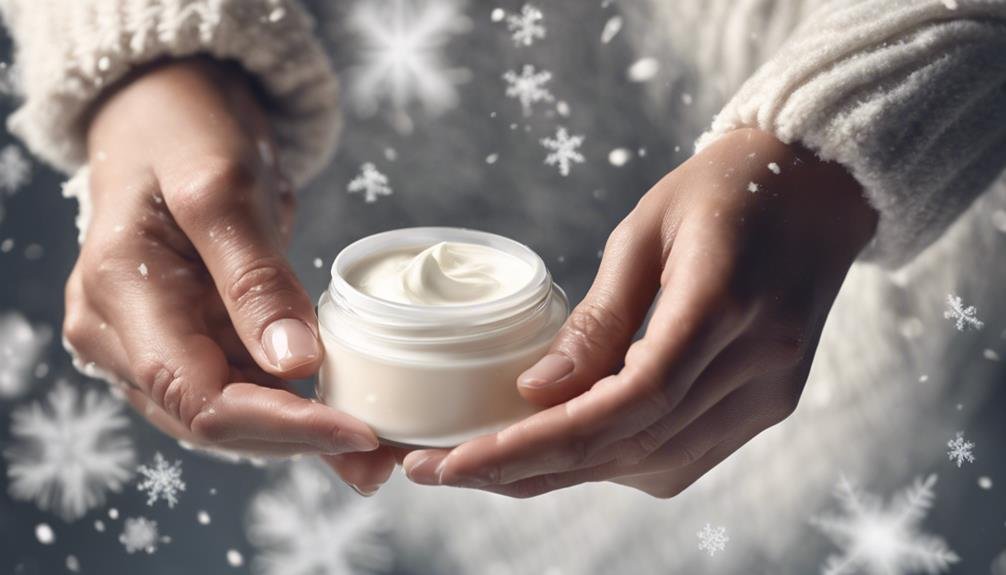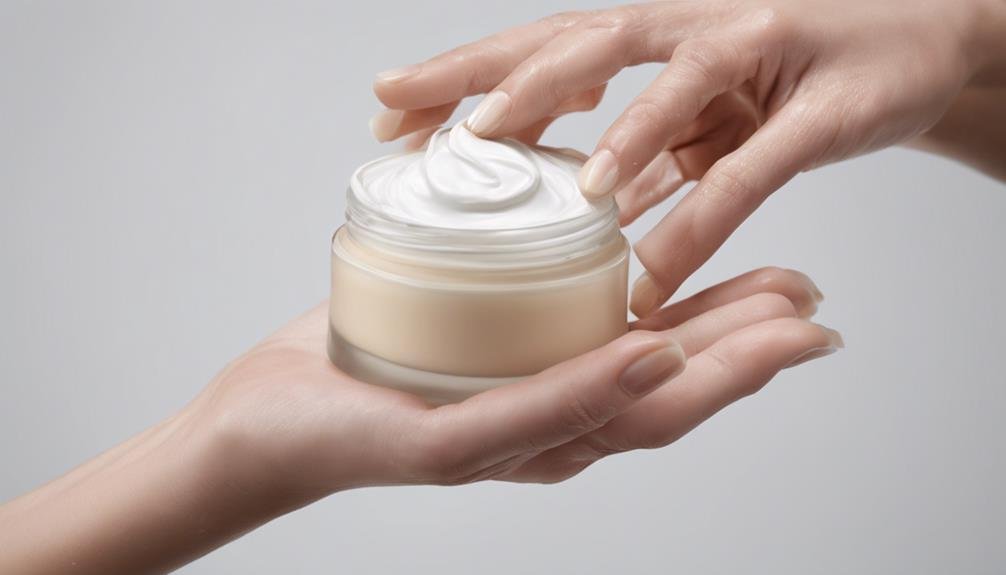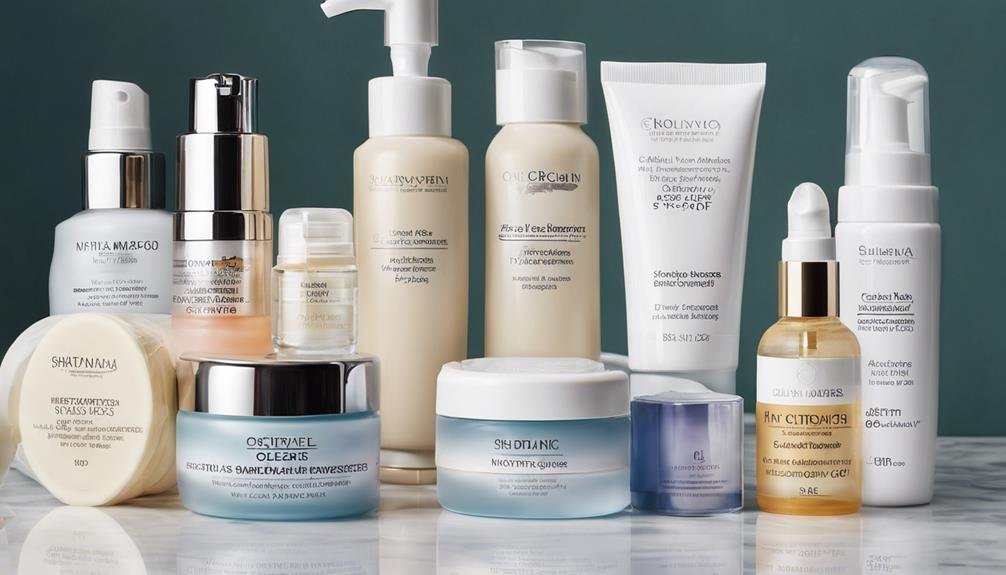"Cherishing Little Steps - A Haven for Baby and Family Journeys"
How to Protect Your Skin in Winter
As winter approaches, did you know that the humidity levels drop significantly, leading to increased skin dryness and potential damage? To prevent this, ensuring proper skin protection is crucial. From adjusting your skincare routine to incorporating specific products, there are numerous ways to safeguard your skin during the colder months. By following these tips, you can maintain healthy and glowing skin even in the harshest winter conditions.
Key Takeaways
- Hydrate skin with moisturizers like hyaluronic acid.
- Use gentle cleansers with hydrating ingredients.
- Apply sunscreen with SPF 30 or higher daily.
- Avoid hot showers and invest in a humidifier.
- Choose skincare products with nourishing ingredients for winter.
Hydrate Your Skin

To maintain healthy and hydrated skin during the harsh winter months, it's essential to prioritize moisturization. The cold air outside and the dry heat indoors can strip your skin of its natural oils, leading to dryness, flakiness, and even irritation. Opt for a rich, nourishing moisturizer that contains ingredients like hyaluronic acid, glycerin, or shea butter to help lock in moisture and protect your skin barrier.
Applying moisturizer immediately after showering or washing your face while your skin is still damp can help seal in hydration. Consider using a thicker cream at night to provide extra hydration while you sleep.
Don't forget about your hands, lips, and body – they need moisture too. Using a humidifier in your home can also help combat the dry air and keep your skin hydrated.
Use a Gentle Cleanser
When it comes to maintaining healthy skin during the winter, using a gentle cleanser is crucial. Harsh cleansers can strip away your skin's natural oils, leading to dryness and irritation, especially in the cold, dry winter months. Opt for a cleanser that's fragrance-free and formulated for sensitive skin to avoid any unnecessary irritation. Look for ingredients like hyaluronic acid, glycerin, or ceramides that help to hydrate and protect your skin's barrier.
A gentle cleanser will effectively remove dirt, oil, and makeup without causing any damage or dryness. It's essential to cleanse your face both in the morning and at night to get rid of impurities that can build up throughout the day and overnight.
Remember to use lukewarm water instead of hot water, as hot water can further dry out your skin.
Apply Moisturizer Regularly

Make sure to keep your skin hydrated and protected by applying a moisturizer regularly during the winter months. The cold weather can strip your skin of its natural oils, leading to dryness, irritation, and even cracking. By incorporating a moisturizer into your daily skincare routine, you can help maintain your skin's moisture barrier and prevent these issues.
When choosing a moisturizer for the winter, opt for a thicker, creamier formula that provides intense hydration. Look for ingredients like hyaluronic acid, glycerin, or shea butter, which are known for their moisturizing properties. Apply the moisturizer to damp skin after cleansing to lock in moisture and keep your skin supple throughout the day.
Don't forget to reapply your moisturizer as needed, especially after washing your hands or spending time outdoors in the cold. Consistent hydration is key to protecting your skin from the harsh winter conditions and maintaining a healthy glow.
Protect With Sunscreen
For optimal skin protection during the winter months, incorporating sunscreen into your daily routine is crucial. Even though the sun may not feel as strong during winter, harmful UV rays are still present and can damage your skin.
Choose a broad-spectrum sunscreen with SPF 30 or higher to shield your skin from both UVA and UVB rays. Apply sunscreen generously to all exposed areas of skin, including your face, neck, and hands, at least 15 minutes before going outside. Reapply every two hours, especially if you're spending an extended period of time outdoors.
Don't forget about areas like your ears, lips, and scalp, which are often overlooked but still need protection. Opt for a moisturizing sunscreen to combat the dryness that winter weather can cause.
Avoid Hot Showers

Regularly indulging in hot showers during the winter months may seem like a comforting way to warm up after being out in the cold. However, hot water can strip your skin of its natural oils, leaving it dry, irritated, and more prone to damage. To protect your skin during the winter season, it's essential to avoid hot showers. Here's why:
- Strips the Skin: Hot water can strip away the natural oils on your skin, leading to dryness and irritation.
- Weakens the Skin Barrier: Excessive heat can weaken the skin's protective barrier, making it more susceptible to environmental aggressors.
- Increases Sensitivity: Hot showers can increase skin sensitivity, causing redness, itching, and discomfort.
To maintain healthy and hydrated skin in winter, opt for lukewarm showers and limit your time under running water. Your skin will thank you for the gentle care and retain its natural moisture barrier, keeping it soft and supple throughout the cold season.
Invest in a Humidifier
Enhancing the moisture levels in your indoor environment can significantly benefit your skin during the dry winter months. Investing in a humidifier is a simple yet effective way to combat the harsh effects of winter on your skin.
Humidifiers work by adding moisture to the air, preventing it from becoming too dry, which in turn helps to keep your skin hydrated.
Dry indoor air can strip your skin of its natural oils, leading to dryness, flakiness, and irritation. By using a humidifier, you can maintain a healthy level of moisture in the air, which will help your skin retain its natural hydration and prevent it from drying out.
Place a humidifier in the rooms where you spend the most time, such as your bedroom or living room, to maximize the benefits for your skin. Ensure to clean your humidifier regularly to prevent the growth of mold or bacteria, which could have the opposite effect on your skin.
Wear Protective Clothing

To shield your skin from the harsh winter elements, wearing protective clothing is essential. Here's how you can ensure your skin stays healthy and glowing during the colder months:
- Layer Up: Dressing in layers not only keeps you warm but also helps protect your skin from cold winds and low temperatures. Start with a moisture-wicking base layer to keep sweat away from your skin, add a thermal layer for insulation, and finish with a waterproof and windproof outer layer to shield you from the elements.
- Cover Exposed Areas: Don't forget to protect often overlooked areas like your ears, hands, and neck. Invest in a good pair of gloves, a cozy scarf, and a stylish hat to keep these areas covered and safe from frostbite and dryness.
- Choose the Right Fabrics: Opt for breathable fabrics like cotton or moisture-wicking materials that won't irritate your skin. Avoid rough wool directly on your skin and instead layer it over softer fabrics to prevent itching and irritation.
Exfoliate Gently
How can you effectively maintain smooth and radiant skin during the winter months? One essential step is to exfoliate gently. Exfoliating helps remove dead skin cells, allowing for better absorption of moisturizers and treatments. However, it's crucial to exfoliate with care, especially in the winter when the skin is more fragile. Here are some tips for gentle exfoliation:
| Exfoliating Tip | Description | Frequency | Recommended Products |
|---|---|---|---|
| Use a Gentle Scrub | Opt for a mild exfoliant with round beads or enzymes to avoid irritating your skin. | 1-2 times a week | Exfoliating cleansers with ingredients like oatmeal or jojoba beads |
| Avoid Harsh Scrubs | Stay away from products with sharp particles like nutshells, which can cause microtears on the skin. | – | Exfoliating pads with glycolic acid or lactic acid |
| Be Gentle | Apply gentle pressure when exfoliating to avoid damaging the skin barrier. | – | Soft washcloths or konjac sponges |
Choose the Right Products

For effective skin protection during the winter, selecting the right products is paramount. When choosing skincare products for the winter months, keep in mind the specific needs of your skin during this time. Here are some tips to help you make the best product choices:
- Rich Moisturizer: Opt for a heavier, more emollient moisturizer during winter to combat dryness and keep your skin well-hydrated. Look for ingredients like hyaluronic acid, glycerin, or shea butter to lock in moisture and prevent moisture loss.
- Gentle Cleanser: Avoid harsh cleansers that can strip your skin of its natural oils, leading to further dryness and irritation. Choose a mild, hydrating cleanser that will effectively cleanse your skin without compromising its natural barrier.
- Protective Lip Balm: Don't forget to care for your lips. Invest in a nourishing lip balm with ingredients like beeswax or coconut oil to prevent chapping and keep your lips soft and smooth throughout the winter.
Selecting the right products tailored to the season can help maintain your skin's health and vitality during the colder months.
Stay Hydrated
Ensuring your skin stays hydrated is crucial for maintaining its health and appearance, especially during the dry winter months. Hydration helps to combat dryness, flakiness, and irritation, leaving your skin looking radiant and feeling smooth. Apart from using moisturizers, drinking an adequate amount of water daily is essential for keeping your skin hydrated from the inside out. Here are some tips to help you stay hydrated and keep your skin glowing:
| Stay Hydrated Tips | Description |
|---|---|
| Drink Water | Aim for at least 8 glasses of water a day to keep your skin hydrated and healthy. |
| Use a Humidifier | Combat indoor dryness by using a humidifier to add moisture to the air. |
| Eat Water-Rich Foods | Incorporate fruits and vegetables high in water content, like cucumbers and watermelon, into your diet. |
| Limit Alcohol and Caffeine | These can dehydrate your skin, so consume them in moderation. |
Eat a Healthy Diet

To maintain healthy and vibrant skin, incorporating a balanced and nutritious diet is essential. What you eat can significantly impact the health and appearance of your skin. Here are some key dietary tips to help you protect your skin during the winter months:
- Stay Hydrated: Drinking plenty of water and consuming hydrating foods like fruits and vegetables can help keep your skin hydrated from the inside out.
- Include Healthy Fats: Omega-3 fatty acids found in foods like salmon, walnuts, and flaxseeds can help maintain skin health and improve its elasticity.
- Antioxidant-Rich Foods: Incorporate foods rich in antioxidants, such as berries, dark chocolate, and green tea, to protect your skin from free radical damage and promote a healthy glow.
Get Enough Sleep
Getting enough sleep is crucial for maintaining healthy skin, especially during the winter months. When you're sleep-deprived, your body produces more of the stress hormone cortisol, which can lead to increased inflammation in the skin, making it more prone to conditions like acne and eczema. Aim for 7-9 hours of quality sleep each night to allow your skin the time it needs to repair and regenerate.
During the night, your skin goes into repair mode, working to undo damage from the day's exposure to environmental aggressors like dry indoor air and harsh winds. Lack of sleep disrupts this crucial repair process, leaving your skin looking dull and tired.
Additionally, inadequate sleep can lead to increased water loss through the skin, resulting in dryness and a compromised skin barrier.
Prioritize your sleep routine by establishing a calming bedtime ritual, creating a comfortable sleep environment, and limiting screen time before bed. Your skin will thank you for the rejuvenating effects of a good night's rest.
Frequently Asked Questions
Can I Use the Same Sunscreen for My Face and Body?
Yes, you can use the same sunscreen for your face and body. It's crucial to choose a broad-spectrum sunscreen with an SPF of 30 or higher for optimal protection. Apply generously and reapply every two hours.
Is It Necessary to Apply Moisturizer at Night?
Yes, it is necessary to apply moisturizer at night to hydrate and repair your skin while you sleep. Moisturizing at night helps replenish lost moisture, promotes cell regeneration, and enhances skin barrier function, leading to healthier, more radiant skin.
Should I Exfoliate My Skin if It's Already Dry?
If your skin is already dry, avoid exfoliating as it can further irritate and strip moisture. Instead, focus on gentle cleansing and hydrating products to nourish your skin. Remember, hydration is key for maintaining healthy skin in winter.
How Often Should I Wash My Face in Winter?
In winter, wash your face twice daily with a gentle cleanser to remove dirt and oil without stripping moisture. Adjust frequency based on skin type and activity level. Hydrate and apply moisturizer immediately after to maintain skin health.
Can I Skip Sunscreen on Cloudy Winter Days?
On cloudy winter days, skipping sunscreen may seem harmless, but ultraviolet rays can still penetrate clouds and harm your skin. Protect yourself by applying sunscreen daily, even when the sky looks gray.
Conclusion
In conclusion, by following these simple steps to protect your skin during the winter months, you can maintain a healthy and hydrated complexion. Remember, your skin is your body's first line of defense, so treat it with care and nourishment. Embrace the winter season with confidence and glowing skin by prioritizing hydration, gentle skincare, and sun protection. Your skin deserves the best care, so take the necessary steps to keep it looking and feeling its best.

